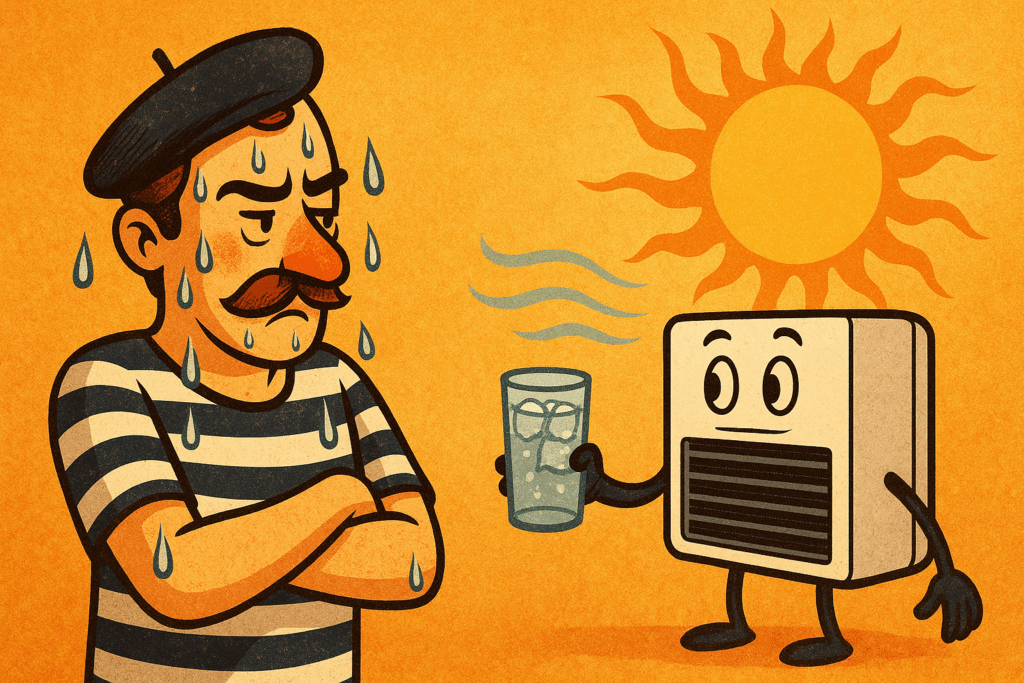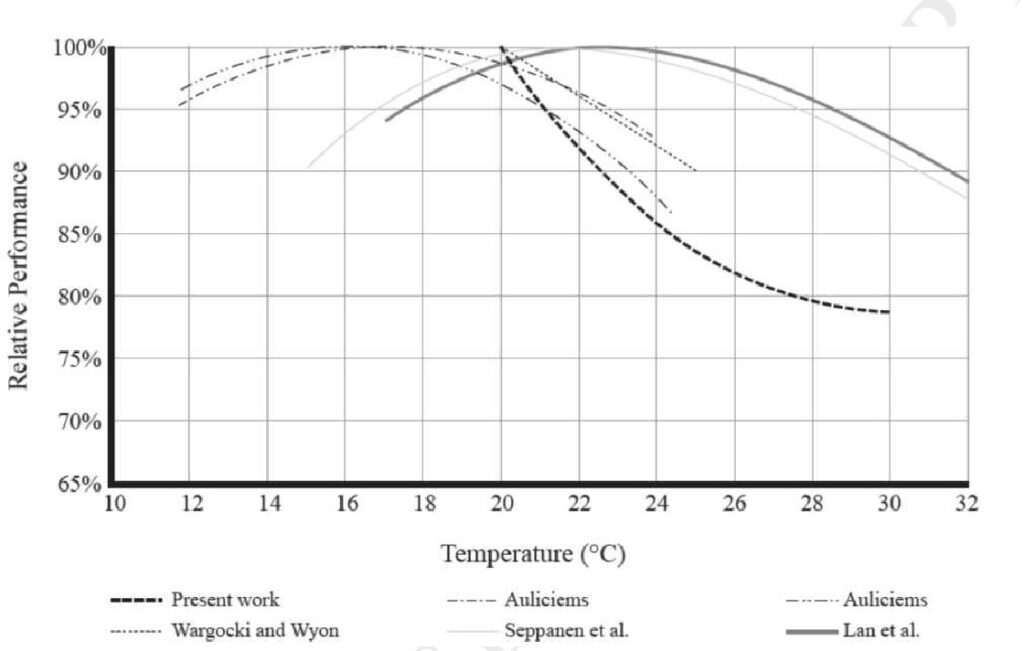France is hot and does (almost) nothing. As heat waves intensify and multiply in France, the question of air conditioning remains strangely taboo in our country. As the YouTube channel "Le Point Genius" explains, French culture has never really embraced air conditioning, often perceived as an unnecessary luxury, or even an ecological blight.
Yet, in the face of rising temperatures and increasingly frequent heatwaves, this cultural rejection now seems counterproductive, and sometimes fatal. From our homes to the digital infrastructures supporting our web hosting, via our workspaces, thermal management is becoming an increasingly critical issue raising several questions.
Is air conditioning really as harmful as people think? What is its true ecological impact? And what are the risks of not cooling off? Here are the answers.

Contents
A French mismatch that costs lives
The Point Genius video reminds us of a striking figure: more people die from the heat in Paris today than in São Paulo.
The reason? An ideological rejection of air conditioning, despite its obvious health benefits. Air conditioning is no longer a superfluous luxury in the face of heatwaves; it has become a public health tool, especially for the most vulnerable: the elderly, children, the sick and teleworkers confined to poorly insulated apartments.
Faced with this reality, the government's response, though mobilized, remains timid and largely focused on short-term measures: occasional school closures, awareness campaigns to drink water and avoid physical exertion. Bottled water is distributed and fans with ice cubes are installed, when more permanent and effective solutions already exist.
Air-conditioning is still seen as an exception that can only be tolerated in hospitals or "cool zones", but not as a normal, widespread solution for homes or workplaces.
It makes you wonder whether the famous " Refractory Gauls "Wouldn't you rather be on the government's side...

Real losses in productivity and concentration
Point Genius also points to another major problem: heat has a direct impact on cognitive performance and productivity. In a country where telecommuting is becoming increasingly popular, how many people now spend their days in rooftop apartments where the temperature exceeds 30°C, even at night? It's not just a question of comfort, it's a real loss of economic efficiency and a deterioration in working conditions.
Whether at school or at work, there's a significant drop in productivity when the temperature rises. This can be seen very clearly in the following graph with students (dashed curves) and office workers (solid lines).

P. Wargocki, J. A. Porras-Salazar, Sergio Contreras-Espinoza
Published in Building and Environment 1 June 2019
Companies are certainly being encouraged to adapt working hours and provide water, as the government reminds us in its announcements, but this remains a patch on a wooden leg if the heart of the problem is not addressed: the thermal environment of living and working spaces.
Air conditioning: choosing the right equipment to limit energy impact
Air conditioning, often demonized in France, isn't as energy-hungry as people think, especially if it's well used and well chosen. Point Genius makes an essential distinction between two types of air conditioner:
- Single-package air conditioners (all-in-one): Very common in rental or emergency solutions, they consume enormous amounts of energy because they extract warm indoor air and discharge it through a duct to the outside. The unit then sucks in warm outside air, which greatly reduces its efficiency and causes it to consume much more energy. It's energy-intensive, noisy and inefficient, but it's usually the only option when you're renting.
- Split air conditioners: Much more efficient, these units separate the indoor unit from the outdoor unit. The indoor air is cooled in a closed circuit, resulting in greater energy efficiency and much lower consumption. Their installation cost is higher, but their efficiency is far superior, both for cooling and for heating in winter in the case of reversible models. However, this is only possible if you own the property, or if you have obtained the agreement of your landlord.
The key message: well-chosen, well-adjusted air-conditioning (around 26-28°C, not 20°C as in American shopping malls), powered by low-carbon electricity (as is the case in France thanks to nuclear power), has a measured environmental impact, especially in relation to the health and economic benefits it brings.
Refrigerant gases: a real issue, but one that needs to be put into perspective
One of the arguments frequently put forward against air conditioning concerns the refrigerant gases used in cooling systems. It's true that these gases, particularly HFCs (hydrofluorocarbons), have a very high global warming potential (GWP), often several thousand times greater than that of CO₂. Their accidental release or poor end-of-life management can therefore contribute significantly to climate change. However, it's essential to put this impact into context: according to the International Institute of Refrigeration, about 20 % of air-conditioning-related emissions come from these gas leaks, while 80 % of emissions are due to electricity consumption. In France, where electricity is largely decarbonized, this energy impact is much lower than in countries powered by coal or gas plants.
Par ailleurs, les technologies évoluent également : les fabricants tendent à remplacer progressivement les gaz les plus polluants par des fluides à faible PRG, voire par des alternatives naturelles comme le propane ou le CO₂ (dans certains systèmes industriels). Ce risque, bien réel, is not inevitable It can be drastically reduced by careful maintenance of equipment, stricter manufacturing standards and efficient end-of-life recycling. This is a matter of good industrial practice, not a reason to reject air conditioning out of hand, especially in regions where it is becoming a health necessity.
The need for cultural and political change
France still seems to be mired in an old dogmatic reflex that pits ecology against technology. Yet, in reality, to refuse air conditioning today is to ignore existing solutions that can save lives. The aim is not to over-air-condition, but to strike a balance between using air-conditioning sensibly and improving building insulation, without systematically pitting the two strategies against each other.

The government is timidly beginning to integrate these issues into its "National Plan for Adaptation to Climate Change", but we're still a long way from an ambitious response. Thermal renovation of buildings has been mentioned, but the resources are still insufficient to deal with the emergency, and above all, there is no clear policy on air conditioning, apart from in hospitals and "refreshed zones".
Conclusion: leave dogma behind and embrace reason
As an ecologically committed web host, LRob is sensitive to climate issues and sobriety. In a data center, the situation is quite different, because in some areas, every watt consumed has to be cooled additionally. That's why we've chosen a geolocation allowing natural air cooling 98% of the year. But as the climate evolves, this number could fall in the years to come.
Nevertheless, after years of braving the heat, we feel that air conditioning is now essential to the smooth running of our home office (telecommuting) services. Aided by the unbearable heat, we braved Franco-French dogmatism to equip ourselves with an air conditioner. So the customer support will stay cool, retaining lucidity and efficiency to continue providing you with the best web hosting.
Whether you're a citizen, a company or a public decision-maker, it's time to accept that air conditioning is part of the (productive, even vital) solution, as long as you use it sensibly and responsibly. Air conditioning is not the enemy. Its misuse is. As Le Point Genius explains so well, it's not a question of air-conditioning everything to 14°C, as in New York, but of creating liveable environments adapted to the new climatic realities.
It's time for France to move away from this anti-climate culture, which marginalizes it in relation to its European neighbors and prevents it from responding effectively to a growing public health problem. Better information, better equipment and better regulation are the most sensible ways forward.










Leave a Reply to Thib Cancel reply